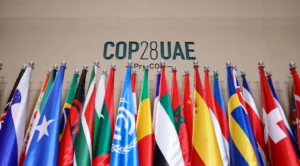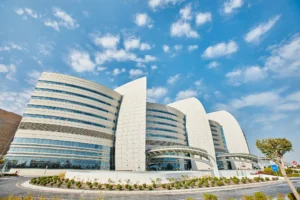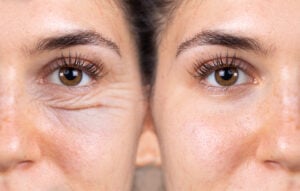Climate change is one of the greatest challenges facing humankind, and our healthcare systems could be part of the solution. Whilst the two areas are not always linked, an increasing number of organisations from the WHO onwards are making an explicit connection.
According to Emma Lawrance and Mala Rao, writing in the British Medical Journal (BMJ), the climate crisis is a public health crisis. “The true measure of COP (the UN’s annual Conference of Parties and Climate Change Conference) should the safeguarding of the health and wellbeing of people.”
Dr Lawrance is the Mental Health Innovations Fellow at the Institute of Global Health Innovation at Imperial College London, and co-author Mala Rao is a Senior Clinical Fellow at Imperial College London and director of the Ethnicity and Health Unit. They point out that COP27, held in Egypt in November 2022, saw increased representation from the fossil fuel industry. “The banners adorning the conference buildings spoke to “science,” “energy,” “food,” and the “environment,”—but not to health”, they wrote.
Health leaders need to attend every COP and to demand that health becomes the core currency of future negotiations.”
Dr Lawrance et.al - Imperial College London
Food insecurity
The latest report from the Intergovernmental Panel on Climate Change (IPCC), the United Nations’ chief climate science body, Climate Change 2023: Synthesis Report, points out that the world is already seeing growing food insecurity due to damage to crops, livestock and fisheries. There is economic damage to exposed sectors including agriculture, energy and tourism. The report also highlights the threats to health from displaced populations, malnutrition, excess temperatures and the spread of infectious diseases.
Many of the impacts of climate change will be felt by healthcare systems worldwide, which will have to provide support to challenged communities. But can health professionals do more than respond reactively to growing problems? Dr Lawrance argues that health leaders can be change agents in their own health systems. “The launch of the Office of Climate Change and Health Equity in the US recognises the inextricable link between health and wellbeing and climate change,” she writes. “Health leaders must promote this understanding globally.”
Wellcome, the independent medical charitable foundation with assets of £38 billion (formerly the Wellcome Trust), highlights climate change as one of the three greatest health challenges facing the world, together with mental health and infectious diseases. In 2022 they appointed Alan Dangour as Director of Climate and Health to lead a new strategy to put health at the heart of climate change action.
One of the issues he highlights is the spread of mosquito-borne diseases, such as dengue fever, as the carrier insects expand their range. Whilst most cases of dengue worldwide occur in Brazil and neighbouring countries in South America, it also has a presence in Africa in Sudan, and Asia in Thailand, Vietnam, Malaysia, Cambodia, Laos, Singapore and Sri Lanka. “As global temperatures rise, diseases that were once confined to warmer regions are expanding their range,” explains Dangour.”Warm temperatures and wetter environments suit the lifecycles of many carriers vectors associated with infectious diseases. This poses an increasing risk to human health.”
Economic cost
The World Health Organisation (WHO) estimates that climate change will be responsible for an additional 250,000 deaths annually from 2030 on due to malnutrition, malaria, diarrhoea and heat stress alone. There is an economic cost to all this too. “The direct damage costs to health are estimated to be between US$ 2–4 billion per year by 2030,” says the Organisation, “and areas with weak health infrastructure will be the least able to cope.”
Opening a Strategic Round Table in May 2023, the WHO Director-General Dr Ghebreyesus, said: “The most pressing reasons for urgent climate action are the impacts on health right now. The climate crisis is a health crisis, fuelling outbreaks, contributing to higher rates of noncommunicable diseases, and threatening to overwhelm our health workforce and health infrastructure.”
According to some speakers, the answer is to build resilient health systems that can continue to ensure optimal healthcare provision in an ever-evolving landscape. But healthcare is a climate change driver, with intensive use of water, vehicles, buildings, energy, and packaging. The health sector worldwide is estimated to be responsible for 5.2% of global emissions.
Leading the change
Around the world, this has begun to change. The UK’s NHS aims to reach net zero – contributing no greenhouse gases – by 2045; at at COP26 in 2021, twenty countries committed to net-zero health care system emissions by 2050.
One of the leaders in Latin America is the Hospital San Rafael de Pasto in Colombia, which cut emissions by 64% in just four years by introducing LED lighting, solar-powered lighting and water heating equipment; the construction of a solar-powered clothes and linens drying station; and the modernisation of its boilers. Hospital Environmental Manager Jorge Darío Duque explained: “Environmental management is a crucial strategy that supports inclusive health care. We have committed to driving changes that allow for better patient care while ensuring balance with the needs of our planet.”
District Six Clinic in Cape Town, South Africa, was built during a severe drought in the country, incorporating a rainwater harvesting system with six 5000-litre tanks collecting and filtering rainwater to be used in the clinic’s toilets. Over 20% of the facility’s water use is now supplied by harvested water, and the system is set to be replicated at other clinics. In Australia, the Nepean Blue Mountain Health District has installed a solar power plant, upgraded lighting, power and boiler systems, and upgraded its fleet of vehicles to include 201 hybrid vehicles or 74% of the total.
UAE goals & COP28 ‘health day’
The UAE made history as the first country in the Middle East and North Africa to announce a net zero emissions target with the introduction of the UAE Net Zero by 2050 strategic initiative in October 2021. In a significant announcement coinciding with the UAE hosting the 28th conference of the Parties to the UN Framework Convention on Climate Change (COP28), PureHealth, a prominent healthcare group, has achieved a remarkable milestone by becoming the first health company in the region to commit to reaching net zero emissions by 2040. This bold commitment demonstrates PureHealth’s dedication to combatting climate change and surpasses the global target set by the Paris Agreement.
Expressing his satisfaction, His Excellency Dr. Sultan Ahmed Al Jaber, COP28 President-Designate and UAE Minister of Industry and Advanced Technology, stated:
Climate change presents a serious threat to human health with health shocks and stresses already pushing around 100 million people into poverty every year. If the world doesn’t take decisive action, this will only worsen.
His Excellency Dr. Sultan Ahmed Al Jaber
Her Excellency Mariam Bint Mohammed Almheiri, UAE Minister of Climate Change and Environment, commended PureHealth for their ambition and went on to share:
The healthcare sector plays a crucial role in climate action, as climate change is not only about protecting the environment but also strongly linked to people's health and quality of life. It affects the well-being of individuals and the future of humanity as a whole.
Her Excellency Mariam Bint Mohammed Almheiri
In January 2023, the Department of Health (DoH) Abu Dhabi announced its intention to reduce carbon emissions by 20 per cent by 2030 and reach Net Zero by 2050. The initial focus will be on green building technologies for infrastructure, transitioning to clean and renewable energy sources, seeking sustainability in procurement, transport and water, and improving healthcare waste management.
Hind Al Zaabi, Executive Director of Healthcare Facilities at DoH, stated, “The announcement of the healthcare ecosystem’s sustainability goals will allow us to establish a solid governance model for Green Hospitals across the Emirate over the next few years. We are working with our partners across the sector to develop Abu Dhabi-specific accreditation and labelling for Green Hospitals. A new sustainability index, “Emerald Muashir”, will be added to “Muashir”, the Emirate’s healthcare quality index. Following the launch of “Emerald Muashir” healthcare facilities will be granted specific accreditations that showcase their adaptation to the sustainability goals and guidelines.”
In a momentous announcement, Mr. Adnan Z. Amin, CEO of COP28, revealed the inclusion of a ‘Health Day’ as an integral part of this year’s conference agenda. The Day will include a Health and Climate Ministers meeting and serve as a platform to deliberate on the intricate relationship between climate change and public health. The WHO Director-General emphasized the importance of this move. “We must promote actions that both reduce carbon emissions and improve health. We need renewable energy in healthcare facilities and dedicated funding to the health sector for climate resilience.”
About MTM Global
MTM Global is a UK-based international healthcare consultancy and online travel agency specializing in premier health tourism.
For all corporate and media inquiries, click here.











